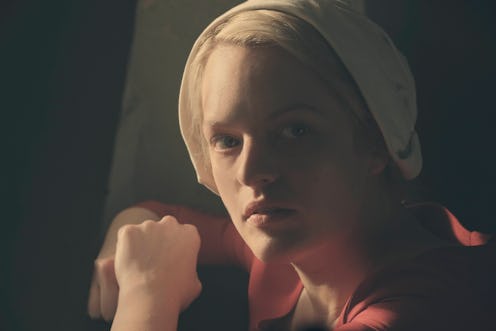Entertainment
This Behind-The-Scenes 'Handmaid's Tale' Video Will Put You In Offred's Shoes

When The Handmaid's Tale premiered on Hulu, it was easy to take all of the pessimistic energy coming out of 2017 and label the apocalyptic series "relevant" and "eerily foreboding" in its depiction of an uber-conservative society. But what's relatable about June, Moira, and Emily can also be inspiring as well. As part of the Season 1 Blu-ray & DVD release on March 13, this exclusive behind the scenes interview highlights why The Handmaid's Tale is relatable in positive ways as well as negative ways.
For one thing, unlike Katniss Everdeen or Jessica Jones and other kick*ss heroines in adventure stories, these women don't have advanced training or superpowers. In the first season, they barely even take up arms. They're as normal as the characters on Girls or Broad City. Even though the world of The Handmaid's Tale is (hopefully) not aspirational in any way, the heroism of the women fighting against this system is admirable.
"She's just like me or you," says actor Elisabeth Moss in the video. "She's not a fighter. She doesn't know how to use a weapon. She doesn't have any special skills. She worked at a book publisher."
The heroism and survival skills that the characters acquire come from within. As the feature says, this was part of the goal of the series from the very beginning. "We very much wanted to focus on the human aspect," says Moss. "For it to be relatable. For you to be able to see yourself in this world."
The similarities between Moss and the character attracted her to the role in the first place. "I am a fertile woman of 34," she says, "and if Gilead happened now, I would be a handmaid."
It's easy to watch Buffy The Vampire Slayer and criticize the characters from the comfort of our couch for choosing the wrong weapons or not killing a clear enemy. Even shows like The Walking Dead beget a certain kind of extreme survivalism. You can't do that as easily with The Handmaid's Tale. It's a subtle world that's tricky to navigate for even the most powerful characters.
The Handmaid's Tale forces you to wonder "what would I do in this situation" and really think about that, no matter what the result. It's extraordinarily, scarily easy to place yourself in this world.
Samira Wiley, who plays Moira, talks in the clip about the relevance of the fictional Gilead as well, touching on how closely it could mirror our current world. "It seems far away," she says, "but it also seems like it could be so close. I think the show does that well, showing us little by little how it could happen."
The small steps that take America down the path to Gilead are not unlike the news alerts today that you briefly roll your eyes at, then toss your phone down and get back to work. It's the way you don't always notice at first the microaggressions happening to you and to others around you. The Handmaid's Tale may not be a direct forecast of what's to come in society, but it does show how easily and sneakily regressive change can happen. But, Handmaid's Tale isn't just about showing that dark side — the actors want the show to be a beacon of light, too. Perhaps a warning.
"I think we as human beings," Wiley says, "want to stay hopeful. That's what keeps us going." This is a story about survival devoid of aliens, creatures, mad scientists, or even desert islands. The normalcy of the world that became Gilead on The Handmaid's Tale is scary in many ways. But, the series shows that hope is never fully snuffed out. It shows that human beings — even regular, untrained, every day people — can survive anything... even each other.